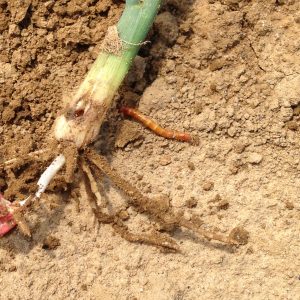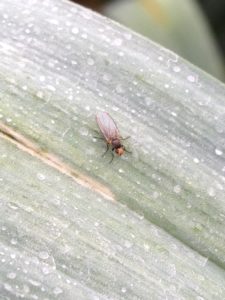Sweet Corn
IPM Program personnel are currently finishing deployment of the black light trap network in New Jersey. At present, we are approximately 80% operational and will begin to monitor traps by the end of this week. We do not anticipate corn earworm (CEW) or European corn borer (ECB) moths for some time yet, but as numbers increase, look for population maps of ECB, CEW, brown marmorated stink bug (BMSB) and CEW catches from pheromone traps in this weekly publication. The resulting full-state maps will include interpretive information.
 Weather plays a large role in the early spring pest populations and damage. Cold, wet springs favor wireworms (photo at left) and seed corn maggot because these conditions slow the growth of the crops, especially sweet corn. If you see wilting corn plants, check the lowest part of the stem just above the roots for wireworm injury. Wireworms will chew into the stem to the growing point and then leave, effectively killing the plant. Seed corn maggots will attack the seeds and germinating seedlings. If there are no small roots and damaged main roots, then white grubs are the most likely pest. There is no rescue treatment for any of these pests. if growers determine that a field must be replanted, it may be necessary to include an in-furrow soil insecticide targeting the wireworms and white grubs. Seed treatments should take care of the seed corn maggots.
Weather plays a large role in the early spring pest populations and damage. Cold, wet springs favor wireworms (photo at left) and seed corn maggot because these conditions slow the growth of the crops, especially sweet corn. If you see wilting corn plants, check the lowest part of the stem just above the roots for wireworm injury. Wireworms will chew into the stem to the growing point and then leave, effectively killing the plant. Seed corn maggots will attack the seeds and germinating seedlings. If there are no small roots and damaged main roots, then white grubs are the most likely pest. There is no rescue treatment for any of these pests. if growers determine that a field must be replanted, it may be necessary to include an in-furrow soil insecticide targeting the wireworms and white grubs. Seed treatments should take care of the seed corn maggots.
Allium leaf miner
Captures of allium leaf miner (ALM) adults on sticky cards have been declining.
Cards from chive plantings in Mercer and Hunterdon counties have captured 2 and 0 flies/week respectively for the week ending 5/05/21. It is anticipated that the first flight should last approximately 6 weeks from first detection (4/4/21 in the central NJ counties). At this time, growers should continue to protect all alliums either with row covers, or weekly insecticide applications. IPM personnel will continue to monitor ALM cards to try to identify the end of this first adult flight. Insecticides recommended for ALM management include:
Spinosyn materials (Radiant, Entrust (OMRI approved)), pyrethroids (Mustang Maxx, Warrior), neonicotinoids (Scorpion, Venom) and the insect growth regulator Trigard are labeled for miner control. The diamide, Exirel, is permitted in NJ under a 2ee label as well.


